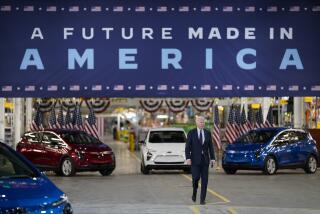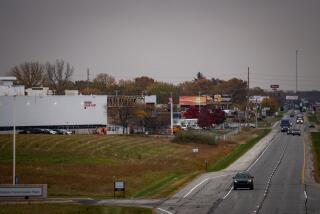Editorial: Civil settlement in the VW scandal is just the start. It’s now time for criminal accountability
A settlement announced early Tuesday over Volkswagen’s rigging of vehicle emissions tests — as clear a case of fraud as you can find — will be good for consumers who, based on VW’s lies, bought diesel cars that secretly spewed unlawfully high levels of pollutants and climate-warming gases into the air. Specifically, the proposed agreement commits VW to buying back or fixing, if a fix is ever figured out, most of the 475,000 excessively polluting VW, Audi and Porsche diesel cars in the U.S. (87,000 of the cars are in California), as well as paying the car owners up to $10,000 each. And that’s appropriate — the people who were directly defrauded should be made whole. The cost to VW: About $10 billion.
The automaker also has agreed to send $2 billion to government agencies for environmental mitigation, promoting such things as electric vehicle charging stations and ride-sharing fleets of zero-emission cars. An additional $2.7 billion will go to governmental and tribal agencies to replace old polluting buses and create new infrastructure at ports to reduce diesel emissions. More than $1 billion of that combined $4.7 billion in spending will occur in California, which, because of high ozone levels in Southern California and high particulate counts in the Central Valley, was inordinately affected by the cheating.
Do the terms of the settlement atone for seven years of fraudulent tests that allowed VW to sell nearly half a million cars that coughed out as much as 40 times the legal levels of nitrogen oxide (linked to smog and global warming) into the atmosphere? The actual damage inflicted on the environment is hard to measure, given that it depends on how and how long the cars were driven. But by imposing a sanction far greater than the profit VW could have made off the cars, the agreement should at least eliminate any economic incentive the industry might have to cheat so brazenly on emissions tests. So that’s a start.
The agreement, reached with the Federal Trade Commission and the California Air Resources Board (a regulatory leader in fighting air pollution), leaves open what to do about 80,000 Porsche, Audi and VW cars with larger and dirtier diesel engines. VW also faces more civil fines under the U.S. Clean Air Act, and the settlement does not preclude future related lawsuits. Notably, it will have no bearing on a criminal investigation being conducted by the U.S. Justice Department.
Unfortunately, the settlement is contingent upon a judge’s approval, which isn’t expected for several months. VW will likely start buying back the cars in October, which means some of them will have spent eight years on the nation’s roadways, excessively polluting every mile along the way.
According to the court filing, when California regulators first reported in 2012 that their real-world tests of the cars yielded much different results from those VW had reported, the automaker hemmed and hawed, offering various alternative theories for the divergent readings. It disclosed that the cars had been outfitted with “defeat devices” — the test-cheating software — only after regulators threatened to bar sales of the 2016 model year cars until the automaker accounted for the discrepancy . So first VW cheated, then it lied.
While it’s good that the consumers will be compensated, and that VW will spend $4.7 billion on programs aimed at reducing emissions, the problem with the cars wasn’t a failure of technology, or bad engineering. In fact, it was quite clever and deliberate. Engineers designed software to track variations in a car’s steering and speed, enabling it to detect when the car was running without a driver — a telltale sign of its emissions being tested on a dynamometer. The program would then direct the engine to operate at “dyno calibration,” or with full emission controls to meet the standards. The rest of the time the software would tell the engine to run on “road calibration,” which improves the car’s performance but blows through the emissions limits. VW installed the software on 11 million vehicles worldwide to evade emissions caps and hide the fact that cars it was marketing as environmentally friendly yet still peppy were, in fact, gross polluters.
Individuals made those decisions. Fines and buybacks affect the corporate bottom line and VW shareholders. But the managers and employees who did this work engaged in an intentional fraud that not only deceived consumers, but also deceived government agencies responsible for trying to ratchet back the amount of climate-changing pollutants that get added to the atmosphere. Such willful acts demand accountability, not just through civil settlements, but in the criminal courts.
Follow the Opinion section on Twitter @latimesopinion or Facebook
More to Read
A cure for the common opinion
Get thought-provoking perspectives with our weekly newsletter.
You may occasionally receive promotional content from the Los Angeles Times.






